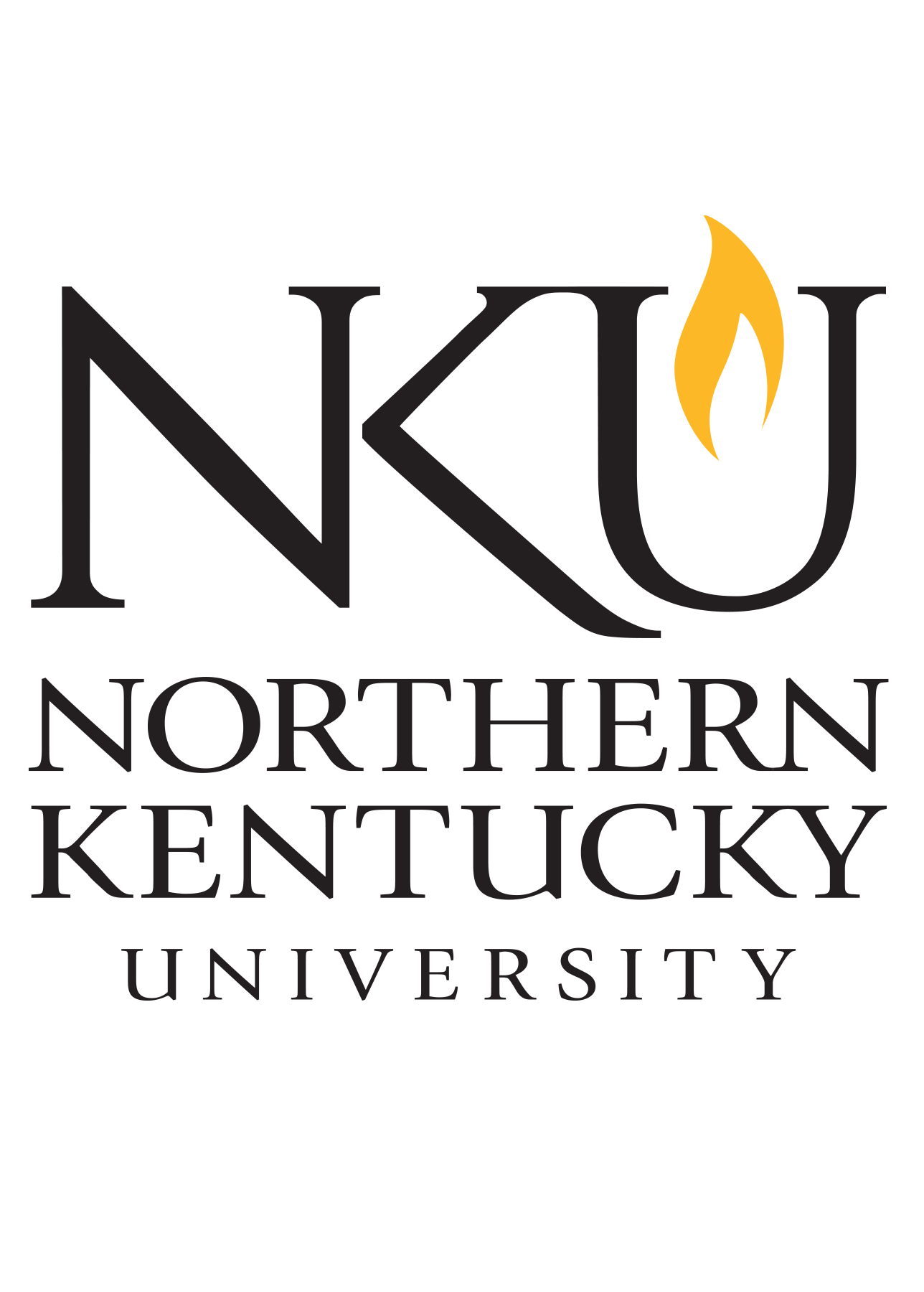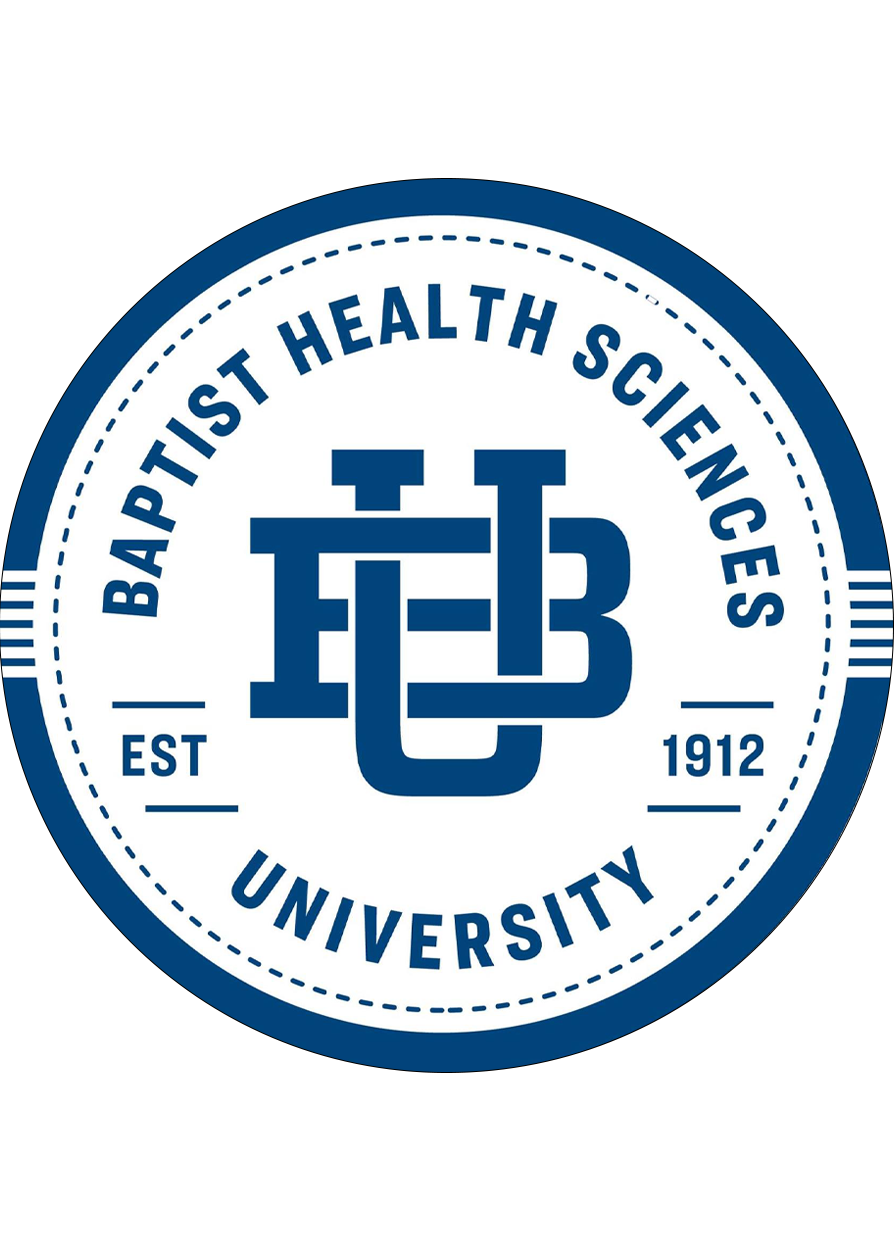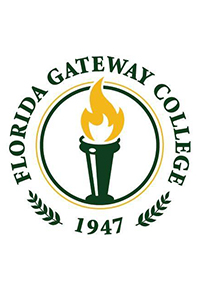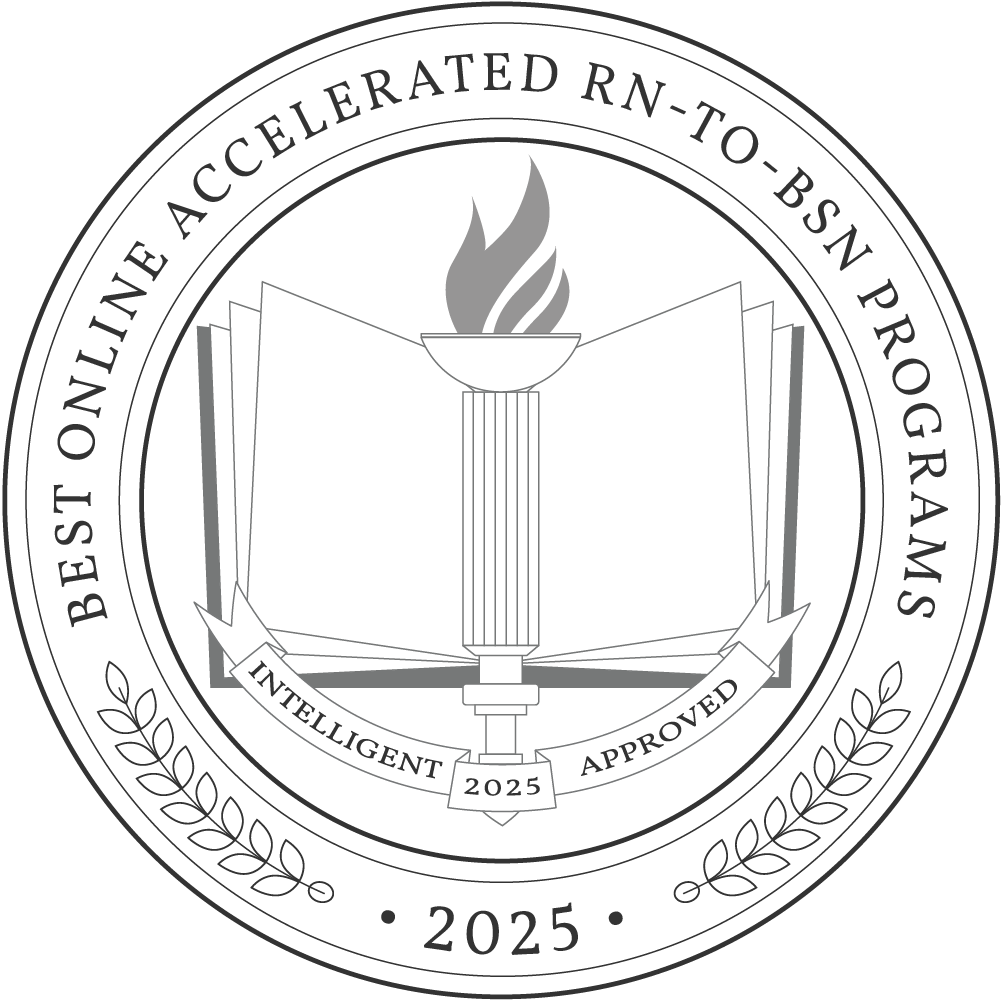While many registered nurses (RNs) start their careers by earning an associate degree or diploma in nursing, completing a Bachelor of Science in Nursing (BSN) can lead to new job opportunities, higher earning potential, and more options for further education. Choosing an accelerated RN-to-BSN degree program helps students level up faster, saving them time and money.
There are several benefits to enrolling in an accelerated RN-to-BSN degree program. Demand for nurses is expected to be high as the U.S. population ages, with an estimated 193,100 new job openings, on average, through 2032. The average salary for an RN with a BSN is $77,080, compared to $61,671 for an RN with an associate degree in nursing (ADN). Online accelerated programs mean students have more flexibility in when and where they complete their coursework.
This article explains what students need to know about online accelerated RN-to-BSN programs and what kind of jobs they can qualify for with a BSN. Blanca Villagomez, a program coordinator and counselor at UC-Irvine, also offers insight into how students can select the right program.
Why Trust Us
The Intelligent.com Higher Education Team is dedicated to providing students with independent, equitable school and program rankings and well-researched resources. Our expert-driven articles cover topics related to online colleges and programs, paying for school, and career outlooks. We use data from the U.S. Department of Education’s College Scorecard, the National Center for Education Statistics, and other reputable educational and professional organizations. Our academic advisory team reviews content and verifies accuracy throughout the year for the most current information. Partnerships do not influence rankings or editorial decisions.
- Analyzed over 2,000 national, accredited, and nonprofit colleges and universities
- 800+ rankings pages are reviewed and updated yearly
- Content is informed by reputable sources, surveys, and interviews with academic advisors and other experts
- Over 100 data points are reviewed for accuracy and quality throughout the year, including sources
How we rank schools
Our list features the best online Accelerated RN to BSN degree programs at top colleges nationwide. Each school featured is a nonprofit, accredited institution — either public or private — with a high standard of academic quality for post-secondary institutions.
We evaluated each school’s program on tuition costs, admission, retention and graduation rates, faculty, reputation, and the student resources provided for online students. We collected data from trusted sources like the National Center for Education Statistics, individual school and program websites, school admissions counselors, and other data sources. Then, we calculated the Intelligent Score on a scale of 0 to 100 based on the following criterion:
Academic Quality:
- Admission rate versus enrollment rate
- Retention rate of students who return after year one
- Accreditation status (regional and programmatic)
- Nonprofit status, both private and public institutions
Graduation Rate
- Overall graduation rate
- Total number of currently enrolled students, including diversity metrics
- Student-to-faculty ratio
Cost and ROI
- In-state and out-of-state per-credit tuition rates and fees
- Required credits to graduate
- Earning potential after graduation
- Availability of federal student loans, scholarships, and other financial aid options
Student Resources
- Available student services for online-only and hybrid programs
- On-campus amenities like tutoring centers and the number of libraries
Read more about our ranking methodology.
Best 25 Online Accelerated RN-to-BSN Programs
FiltersInstitution Type
Status
- Intelligent Score
- Alphabetically By University Name
- Acceptance Rate
- Enrollment
- In-state Graduate Tuition
- Out-of-state Graduate Tuition
- In-state Undergraduate Tuition
- Out-of-state Undergraduate Tuition

University of North Carolina Wilmington
Intelligent Score: 99.5In-state: $7,019
Out-of-state: $34,198
In-state: $10,552
Out-of-state: $10,552
SAT: 1280-1490
ACT: 28-33
$210
Online
Commission on Collegiate Nursing Education
124

The University of Texas at Arlington
Intelligent Score: 99.09In-state: $11,448
Out-of-state: $40,032
In-state: $12,028
Out-of-state: $12,028
SAT: 1210-1470
ACT: 26-33
$257
Online, On-Campus
Commission on Collegiate Nursing Education
120

Appalachian State University
Intelligent Score: 98.07In-state: $4,242
Out-of-state: $19,049
In-state: $4,839
Out-of-state: $4,839
SAT: 1070-1240
ACT: 22-27
Appalachian State University offers three formats for its online RN-to-BSN program, including a one-year option that allows you to earn your bachelor's degree in just three semesters (completing the program at this pace will require about 15 to 20 hours of coursework per week). This school recently received a $150,000 donation from the Dogwood Health Trust, which will fund scholarships for online RN-to-BSN students living in the 18 westernmost counties of North Carolina.
Resident: $176
Non-Resident: $884
Online
Commission on Collegiate Nursing Education
120

Cleveland State University
Intelligent Score: 92.25In-state: $11,185
Out-of-state: $15,952
In-state: $10,215
Out-of-state: $10,215
SAT: 940-1170
ACT: 18-25
In-State: $240
Out-of-State: $243
Online
Commission on Collegiate Nursing Education
120

Ohio State University
Intelligent Score: 87.74In-state: $10,615
Out-of-state: $32,599
In-state: $11,560
Out-of-state: $11,560
SAT: 1210-1430
ACT: 26-32
The Ohio State University is generally regarded as one of the best schools in the country for nursing students. Its RN-to-BSN program allows registered nurses to earn their Bachelor's in Nursing entirely through online courses. Consider this program even if you don't live in Ohio, as it meets the statewide Board of Nursing standards for distance education in all but a handful of states. It's also worth noting that there are absolutely no textbook costs - any material you need to read for your RN-to-BSN courses is either open-source or provided by the university for free. If you'd like to continue your nursing education beyond your bachelor's, Ohio State also offers online programs for Master's in Nursing, Doctor of Nursing Education, and Doctor of Nursing Practice.
$492
Online
Commission on Collegiate Nursing Education
120

University of Wyoming
Intelligent Score: 85.85In-state: $3,480
Out-of-state: $14,472
In-state: $5,076
Out-of-state: $5,076
SAT: 1040-1240
ACT: 21-28
Resident: $258
Non-Resident: $418
Online
Commission on Collegiate Nursing Education
120

University of Arkansas
Intelligent Score: 85.62In-state: $7,568
Out-of-state: $24,056
In-state: $7,752
Out-of-state: $7,752
SAT: 1090-1280
ACT: 23-29
$329
Online
Commission on Collegiate Nursing Education
120

Northern Kentucky University
Intelligent Score: 84.76In-state: $9,912
Out-of-state: $19,872
In-state: $11,034
Out-of-state: $11,034
SAT: 960-1190
ACT: 20-26
$309
Online
Commission on Collegiate Nursing Education
120

Regis College
Intelligent Score: 83.17In-state: $74,631
Out-of-state: $74,631
In-state: $47,504
Out-of-state: $47,504
SAT: 1040-1230
ACT: 23-27
$250
Online
Accreditation Commission for Education in Nursing
125

Baptist Health Sciences University
Intelligent Score: 82.91In-state: $36,622
Out-of-state: $36,622
In-state: $41,533
Out-of-state: $41,533
SAT: 990-1090
ACT: 20-24
$499
Online
Commission on Collegiate Nursing Education
122

Herzing University
Intelligent Score: 82.48In-state: $34,284
Out-of-state: $34,284
In-state: $31,984
Out-of-state: $31,984
SAT: 1,275 or better
ACT: 17 or better
$415
Online
Commission on Collegiate Nursing Education
120

Florida International University
Intelligent Score: 81.62In-state: $4,721
Out-of-state: $16,529
In-state: $8,912
Out-of-state: $8,912
SAT: 1110-1260
ACT: 23-29
In-State: $235
Out-of-State: $648
Online
Commission on Collegiate Nursing Education
120

Florida Gateway College
Intelligent Score: 79.14In-state: $22,670
Out-of-state: $32,583
In-state: NA
Out-of-state: NA
SAT: N/A
ACT: N/A
Resident: $120
Non-Resident: $264
Online
Commission on Collegiate Nursing Education
121

University of Louisiana Monroe
Intelligent Score: 78.42In-state: $5,407
Out-of-state: $19,135
In-state: $5,511
Out-of-state: $5,511
SAT: 1000-1210
ACT: 20-26
$200
Online
Commission on Collegiate Nursing Education
120

Georgia Southern University
Intelligent Score: 78.33In-state: $4,371
Out-of-state: $15,425
In-state: $4,986
Out-of-state: $4,986
SAT: 993-1170
ACT: 18-24
$182
Online
Commission on Collegiate Nursing Education
120

University of North Florida
Intelligent Score: 77.44In-state: $3,996
Out-of-state: $16,799
In-state: $8,570
Out-of-state: $8,570
SAT: 1040-1230
ACT: 20-27
Resident: $142
Non-Resident: $599
Online
Commission on Collegiate Nursing Education
120

University of Louisiana at Lafayette
Intelligent Score: 76.77In-state: $5,407
Out-of-state: $19,135
In-state: $5,511
Out-of-state: $5,511
SAT: 1000-1210
ACT: 20-26
$316
Online
Commission on Collegiate Nursing Education
120

Indiana University
Intelligent Score: 76.08In-state: $9,815
Out-of-state: $36,194
In-state: $9,786
Out-of-state: $9,786
SAT: 1120-1350
ACT: 24-31
In-State: $350
Out-of-State: $455
Online
Commission on Collegiate Nursing Education
120
What You Can Expect from an Online Accelerated RN-to-BSN Program
Accelerated RN-to-BSN programs are designed to help students with a nursing background complete the credits they need for a bachelor’s degree as quickly as possible. For most students, this means completing 30-60 credits or about one to two years of study.
To be eligible for an accelerated RN-to-BSN program, students must have their registered nurse license, which can be obtained with an ADN or nursing diploma. Some RN-to-BSN programs may also require students to have a minimum amount of professional nursing experience.
The curriculum for an accelerated RN-to-BSN program further develops the skills and knowledge students gain through their prior education and experience. Coursework covers health informatics, leadership, case management, advanced clinical skills, and healthcare policy. These courses prepare graduates to take on more intermediate-level nursing roles.
Students in accelerated RN-to-BSN programs may also have the opportunity to choose a nursing specialization in pediatrics, gerontology, psychiatric care, acute care, oncology, cardiology, or OB/GYN care.
As students evaluate online accelerated RN-to-BSN degree programs, there are additional factors they should consider.
Clinical requirements
Hands-on experience in a clinical setting is an integral part of nursing education. Even if an accelerated RN-to-BSN program is described as “online,” it most likely has some in-person requirements for clinical rotations or internships. Students should confirm these requirements with their program before enrolling to verify that they can accommodate them in their schedule. Students should also ask how clinical placements are decided — whether students are responsible for finding their own internship sites or if they’ll be assigned to a site.
Pacing and workload
“Accelerated BSN programs are considered a fast-track approach to earning an education because they offer compressed coursework in a shorter time frame than traditional degree programs,” Villagomez says. “While online accelerated programs offer flexibility, there are no shortcuts with this route. Students are expected to complete the same amount of work in a shorter timeframe, so they require a higher investment of time and energy every week. I usually only recommend them to individuals with strong time management skills, dedication, and discipline.”
Degree completion programs
Accelerated RN-to-BSN degree programs also come in the form of degree completion programs, in which the school accepts up to 90 credits out of the 120 credits needed for a bachelor’s degree. Transferring credits significantly decreases the number of courses a student must take to finish their BSN and is an ideal option for students with an ADN and additional undergraduate credits. Students should always consult an admissions counselor to review their transcripts and confirm what credits will be accepted before enrolling.
Scheduling
For online accelerated RN-to-BSN programs, courses are delivered synchronously, asynchronously, or in a hybrid of both. Synchronous classes meet remotely at the same time every week, like in an in-person setting. This format allows for more direct interaction between students and faculty but requires students to be available on specific days and times. In an asynchronous program, students can access lessons and assignments anytime, giving them maximum flexibility in their school schedule. Students enrolling in asynchronous programs should be comfortable with independent learning, self-discipline, and accountability.
Potential courses you’ll take in an online accelerated RN-to-BSN program
- Professional Nursing Practice: Enhances and facilitates the development of the RN student into a BSN-prepared professional nurse, with a focus on personal and professional growth to promote better advocacy, critical thinking, educator skills, effective communication, and leadership abilities in a complex healthcare environment.
- Health Assessment: Studies the advanced knowledge and skills beyond an Associate in Nursing degree and develops new skills to enhance health assessment for nursing practice in the care of individuals across the lifespan.
- Leadership and Management: Introduces the leadership roles and management functions of professional registered nurses within the structure of an organization.
- Nursing Research Application: Provides RNs with an overview of the major research concepts as applied to the profession of nursing, to scholarship, and to clinical practice, and examines the analysis, critique, and interpretation of qualitative and quantitative research approaches, including ethical implications, for evidence-based nursing practice.
What Can I Do with an RN-to-BSN Degree?
Earning an RN-to-BSN degree can help students prepare for nursing and related roles that require more advanced clinical and professional skills, including specialized areas of nursing, such as neonatology, pediatrics, gerontology, oncology, cardiology, or psychiatric care.
A BSN also prepares students for leadership and administrative roles in health informatics, nurse education, public health, and nurse management. RNs who want to transition from direct patient care but continue working in medical settings may find a BSN helpful.
Students with a BSN can further their healthcare careers by earning a graduate degree. Popular advanced areas of study for nurses include nurse practitioner, nursing administration, physician assistant, or health services.
Career outlook
RNs are expected to be in high demand throughout the next decade. The Bureau of Labor Statistics (BLS) predicts that employment of RNs will grow 6% through 2032, with an average of 193,100 new job openings annually. This job growth is driven by a rapidly aging U.S. population and high turnover in the healthcare industry following the COVID-19 pandemic.
Salaries for RNs vary based on the type of facility, location, and department or specialty, but the median annual wage for RNs in 2023 was $86,070.
How to Choose the Online Accelerated Bachelor’s Degree Program That’s Right for You
Step 1: Determine your needs and priorities
To determine which online accelerated RN-to-BSN program is the best fit for you, it’s important to know what you need.
Are you looking for a degree completion program that will let you maximize your previously earned credits? Do you want a program that will allow you to complete your coursework in the shortest time possible? Can you accommodate a synchronous schedule, or do you need a fully asynchronous program?
You should also reflect on the specific skills you want from this program. If there’s a nursing specialty you want to pursue, look for a program that offers courses in that area. Review clinical requirements and coursework to ensure a program meets all your needs.
Also, consider the type of school you want to attend. Both non-profit and for-profit schools offer accelerated RN-to-BSN programs, and this status can impact how a school spends its money, the quality of its programs, and what financial aid and future employment opportunities students can access. If you’re considering a for-profit school, carefully research its business practices, graduation rates, and outcomes for graduates.
Finally, be mindful of where you want to practice after earning your degree, as regulations govern who can attend which online schools and programs regardless of location. In the U.S., institutions must be authorized by individual states to grant degrees to students living in those states. Without this authorization, non-resident students are ineligible to enroll in the institution. Currently, over 2300 institutions throughout 49 states, Washington D.C., Puerto Rico, and the U.S. Virgin Islands participate in the National Council for State Authorization Reciprocity Agreements (NC-SARA), ensuring their distance education programs are authorized to operate and grant degrees in multiple states. Nursing students should also confirm that the programs they’re considering meet the licenses and certification requirements in the state where they practice.
Step 2: Research schools and programs
Once you’ve set your parameters, begin exploring schools and programs to find those that offer what you seek.
A key piece of information to confirm at this stage is whether the schools you’re considering have institutional and programmatic accreditation. “Verifying the college’s accreditation ensures that the institution has the seal of approval by the U.S. Department of Education,” Villagomez says. “With institutional accreditations, colleges are evaluated as a whole and must achieve several standards of quality. Programmatic accreditations evaluate the quality and legitimacy of the specific degree programs.”
Students can confirm a school’s accreditation using the Council on Higher Education Accreditation (CHEA) database. It’s also important for nursing students to verify that the program is accredited by the Accreditation Commission for Education in Nursing (ACEN) to ensure it meets industry standards for nurse practitioner education. Says Villagomez, “Attending a non-accredited college can negatively impact future post-graduate opportunities such as employment, licensing, and graduate degree programs.”
A key piece of information to confirm at this stage is whether the schools you’re considering have institutional and programmatic accreditation. Institutional accreditation impacts students’ eligibility for financial aid, jobs, and future education opportunities. Students can confirm a school’s accreditation using the Council on Higher Education Accreditation (CHEA) database. It’s also important for nursing students to verify that the program is accredited by the Accreditation Commission for Education in Nursing (ACEN) to ensure it meets industry standards for nurse practitioner education.
Students can learn more about RN-to-BSN programs by visiting school websites, attending virtual open houses and information sessions, speaking to admissions counselors or program representatives, and following schools and programs on social media.
During the research process, get answers to these questions to help you determine if a school is the right fit:
- Who are the faculty, and what are their qualifications?
- What does the curriculum include?
- What are the clinical requirements?
- How do online students interact with classmates and faculty?
- What online student resources, such as libraries, tutoring, career services, and health and wellness, are available?
- What is the program’s total cost, and what types of financial aid are available?
Step 3: Prepare for tests and applications
“Every school sets its own admissions procedures and deadlines, so after researching degree programs, students should have a strong sense of their admission requirements,” Villagomez says. “Highly selective schools often require well-crafted essays, standardized exams, recommendation letters, and sometimes even interviews. With all these requirements, students need to stay organized with a comprehensive and detailed checklist to track their progress, submit all required materials, and meet deadlines.”
As the name implies, having an RN license is a prerequisite for enrolling in this type of program. Some RN-to-BSN degrees may also require that applicants have a minimum amount of professional nursing experience.
A standard application for an RN-to-BSN program includes:
- Completed application and required fees
- Official transcripts from previously attended colleges
- Letters of recommendation
- Personal statement or essay
- Resume or CV
- SAT or ACT scores
Step 4: Select your program
The number of online nursing programs a student applies to varies based on individual needs and preferences. Some students focus on a single program due to format, faculty, specialization options, or cost. Others may apply to several schools to increase the odds of admission. Remember that schools often charge application fees and budget accordingly if you apply to several programs.
After receiving your acceptance offers, compare your options based on your priorities and choose the one that meets all or most of your needs.
Step 5: Determine how you’ll pay for your degree
During the research process, be sure to get information about the total cost of the program as well as the financial aid options available to you.
Most schools offer both need-based and merit-based aid. Need-based aid includes federal and private student loans, grants, scholarships, work-study, and assistantships. Students must complete the Free Application for Federal Student Aid (FAFSA) for need-based aid.
Merit-based aid usually comes in the form of scholarships, grants, or fellowships, and students receive their type of funding based on their academic or professional achievements, extracurricular activities, or demographic traits.
Students working while earning their BSN should find out if their employer offers employer tuition assistance benefits to help subsidize their education. Active-duty military members and veterans may be able to get discounted tuition or use GI Bill benefits to pay for their degrees.
Online Accelerated RN-to-BSN Degree Frequently Asked Questions
Should I get an accelerated RN-to-BSN degree in person or online?
There are pros and cons to both formats. The one that’s best for you depends on your needs and preferences.
In-person learning is best for students who like learning through interaction with classmates and faculty and completing hands-on projects. This type of program also provides more structure and support for those who need it.
Meanwhile, online classes provide more flexibility for students balancing school with other obligations. Students can learn wherever and whenever is most convenient, particularly with asynchronous programs. Students enrolling in an online RN-to-BSN program, especially an accelerated one, should ensure they have the organizational, time management, and self-motivation skills to keep on track.
What is the average cost of an online accelerated RN-to-BSN degree?
According to the National Center for Education Statistics (NCES), in the 2022-23 academic year, the average annual tuition for undergraduate programs was $9,750 at public institutions and $38,421 at private colleges.
However, the actual cost of an RN-to-BSN program will vary based on how many credits the student must complete, what type of institution the student enrolls in, and what other fees the school charges in addition to tuition.
Students attending a public institution should note whether the school has different tuition rates for in-state and out-of-state students or if distance learners all pay the same tuition rate. Students in private schools will pay the same tuition regardless of where they live.
Nursing students should also consider the financial impact of clinical rotations, which may mean taking time off from your current job or budgeting for transportation expenses to your clinical site, like gas, parking, or public transportation.
Students should speak to a financial aid counselor for the most accurate information about a program’s cost.
Is an RN-to-BSN degree worth it?
An RN-to-BSN can increase a student’s earning potential and open new jobs and educational opportunities.
From a career perspective, the demand for nurses will continue steadily through the next decade, driven by an increase in the elderly population and a need to replace RNs who retire, switch careers, or move to advanced positions.
RNs earn a median annual salary of $81,220. Those with a higher level of education can command more money or work in positions that pay more.
However, what determines whether a degree is worth it is whether students are willing to put the time and effort into learning and mastering the skills covered in the curriculum. Before enrolling in an online accelerated RN-to-BSN program, students should be sure they have the energy and time to prioritize their studies to get the most out of their program.
Learn More About Online RN-to-BSN Degrees
- Accelerated Bachelor’s Degree Pros and Cons
- How Long is an RN-to-BSN Online?
- How Much is an RN-to-BSN Online?
- Understanding the Types of Nursing Degrees
- Can You Get a Nursing Degree Online?
- Online Nursing Degrees
- Online Bachelor’s in Nurse Practitioner Degrees
- Online RN-to-BSN Degrees
- Online Master’s in Nursing Degrees


